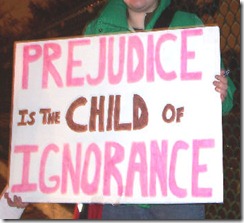In my conversations with people about homosexuality and the Scripture, I have come across several people who challenged me, claiming I always preach against homosexuality and no other sins. They have also claimed I had taken verses out of context to support the view I endorsed beforehand. The most strident of these came from two friends who objected to a blog post I wrote a few years back. I took these challenges seriously and went on a quest to discover if there were things I was not considering. I approached this question with the attitude that my views could be wrong.
First, in thirty-one years of ministry I have only preached one sermon on the issue, it was a series I taught dealing with complicated and messy problems in the church. However, I have preached numerous sermons against greed, unforgiveness, bitterness, sexual immorally, and other sins.
The first thing I did regarding the charge of taking things out of context was to read the entire book of Leviticus, paying particular attention to the overall themes and settings of the various laws. I discovered two overarching themes: 1) God told the people you shall be holy because I am holy, and 2) Do not be like the nations around you.
In the immediate context of the primary passages on homosexuality in Leviticus, God tells the people:
Leviticus 18:1–5 (NRSV) — 1 The Lord spoke to Moses, saying: 2 Speak to the people of Israel and say to them: I am the Lord your God. 3 You shall not do as they do in the land of Egypt, where you lived, and you shall not do as they do in the land of Canaan, to which I am bringing you. You shall not follow their statutes. 4 My ordinances you shall observe and my statutes you shall keep, following them: I am the Lord your God. 5 You shall keep my statutes and my ordinances; by doing so one shall live: I am the Lord.
In other words, the laws which follow are given so that God’s people would not be like the people with which they have had close cultural contact: the Egyptians and the Canaanites. Immediately after the list of prohibited sexual relationships, we find a restatement of the primary reasons:
Leviticus 18:24–30 (NRSV) — 24 Do not defile yourselves in any of these ways, for by all these practices the nations I am casting out before you have defiled themselves. 25 Thus the land became defiled; and I punished it for its iniquity, and the land vomited out its inhabitants. 26 But you shall keep my statutes and my ordinances and commit none of these abominations, either the citizen or the alien who resides among you 27 (for the inhabitants of the land, who were before you, committed all of these abominations, and the land became defiled); 28 otherwise the land will vomit you out for defiling it, as it vomited out the nation that was before you. 29 For whoever commits any of these abominations shall be cut off from their people. 30 So keep my charge not to commit any of these abominations that were done before you, and not to defile yourselves by them: I am the Lord your God.
The clear warning here is for God’s people to not be like the nations around them. Apparently, homosexual behavior was known and practiced openly among the Egyptians and Canaanites, and God did not want the people of Israel drawn into those behaviors. In other words, because the people were in close cultural contact with people who practiced such things, they were explicitly told not to emulate them.
Skipping over the Gospels and Jesus for the moment, I looked at the passages in Paul’s letters.
1 Corinthians 6:9–11 (NRSV) — 9 Do you not know that wrongdoers will not inherit the kingdom of God? Do not be deceived! Fornicators, idolaters, adulterers, male prostitutes, sodomites, 10 thieves, the greedy, drunkards, revilers, robbers—none of these will inherit the kingdom of God. 11 And this is what some of you used to be. But you were washed, you were sanctified, you were justified in the name of the Lord Jesus Christ and in the Spirit of our God.
In this passage, the word translated sodomite (ἀρσενοκοίτης), in some contexts refers to the active person in the sexual relationship in contrast to the word translated male prostitute (μαλακός) the passive participant. As with the passages in Leviticus, Paul most likely mentions this in his letters because the gospel is being proclaimed to Jews and Gentiles in close cultural contact with nations who practice such things.
Why did Jesus not mention homosexuality? It is a fair question and one that deserves an answer. There are of course indirect prohibitions where Jesus lifts up the ideal of heterosexual marriage as God’s ideal (cf. Matt 19:3-9). Recently, Scot McKnight wrote that when Jesus permitted divorce for unchastity (πορνεία) his hearers would have had in mind the sexual prohibitions of Leviticus 18 (http://www.patheos.com/blogs/jesuscreed/2014/04/04/what-is-porneia-to-a-1st-century-jew/)
I think Jesus did not mention homosexuality specifically because he was a Jew speaking to Jews. In their cultural context, the prohibition against this kind of sexual immorality was a given, just like idolatry. Jesus never gives an explicit prohibition against idolatry, except where he plainly states there is only one God. Of the seven occurrences of the word translated idolatry they all appear in Paul’s letters and never in the Gospels. Jesus also never mentions another strictly Jewish practice such as circumcision. However, he does mention the food laws, but only to cancel them out and declare all foods clean (Mk 7:18-23).
It is instructive to look at the so-called Jerusalem Council in Acts 15 when navigating the cross-cultural requirements for Gentiles coming to the faith. As the elders listened to voices from both sides of the argument of how much of the Law of Moses should be compulsory for Gentile converts, James remarked,
Acts 15:19–20 (NRSV) — 19 Therefore I have reached the decision that we should not trouble those Gentiles who are turning to God, 20 but we should write to them to abstain only from things polluted by idols and from fornication and from whatever has been strangled and from blood.
All the laws of the Old Testament were boiled down to two: refrain from association with idolatry and sexual immorality (πορνεία).
Some people claim I reject homosexual behavior because I have had no friends who were homosexual. That too is wrong. A young man who was in the youth group I attended when I was younger, came out as a homosexual after his marriage failed. He was one of the people who challenged me on my views, and we exchanged a few emails. He spoke of his desire to fight against the urges he had, but a few days later posted an inappropriate message to another friend hoping for a sexual hook-up. He apparently didn’t know his message was public. Eventually, because of his severe depression and anxiety, he committed suicide.
Also, in a previous church, there was an elderly gay couple that I regularly interacted with on Sunday mornings and even visited in the hospital when they were sick. Eventually, I preached both of their funerals.
Recently, a former staff member at another church graduated from seminary and later wrote me to say he had identified as gay. This young man was a stellar staff member, and in conversation with him, I assured him of my love for him and reminded him that although he identified as gay, his true identity was in Christ.
Some years ago, I heard about a professor from Duke Divinity School, Richard Hays, who had written a book on Christian ethics entitled The Moral Vision of the New Testament. After laying out what he sees at the ethical gird of the New Testament – community, cross, and new creation, he then applies that framework to various modern issues in the appendices. He tackles the issue of homosexuality in one appendix and concludes that homosexual behavior is inconsistent with the moral vision of the New Testament and further goes on the say those who practice such behavior should not be ordained. He came to these conclusions even while having a lifelong friendship with a gay man. They regularly discussed the issue, and his friend remarked how he felt the pro-gay Christian movement were misleading many in the church.
My search over the past few years has been earnest and humble. I realize I could be wrong, however, what I found was a consistent witness across the church and throughout time. The interpretive ideas set forth by pro-homosexual scholars and other advocates are just wrong and misleading.
In the past year, I have discovered that many, if not most of the people I know who are in support of the ordination of homosexuals and advocating for the church to allow same-sex weddings in their facilities do so for two main reasons. First, socio-political reasons. They see this issue in the same vein as racial issues or women’s issues; this is just the next social issue we need to address. As a colleague remarked in a recent meeting, “We got it wrong with slavery and women, we need to get this one right.” Second, personal reasons. They support removing restrictive language in the Book of Discipline because they have a close friend or family member who is gay. They want things changed because it will somehow be more affirming of their friend.
What I have yet to see is a sound scriptural argument for changing our church’s stance. In groups whenever I bring this up, people say well the scriptures can be interpreted many different ways – and this from seminary-trained individuals. I agree that while different interpretations of scripture can be put forward, the accepted principles of biblical hermeneutics rules some of them out as implausible.
I personally believe that the current debate in the United Methodist Church is more about biblical authority than homosexuality. I pray that Scripture would once again be put in its rightful place and that we would learn to love as Jesus loved.
 Dr. Kevin Watson, Assistant Professor of Wesleyan and Methodist Studies at Candler School of Theology, recently posted a series of tweets in which he posited that, among other things, theological coherence is a vital part of the unity of the United Methodist Church. Earlier in that series of tweets asserted that “the purpose of polity is to protect the unity of the church in the midst…of disagreement.”
Dr. Kevin Watson, Assistant Professor of Wesleyan and Methodist Studies at Candler School of Theology, recently posted a series of tweets in which he posited that, among other things, theological coherence is a vital part of the unity of the United Methodist Church. Earlier in that series of tweets asserted that “the purpose of polity is to protect the unity of the church in the midst…of disagreement.”




